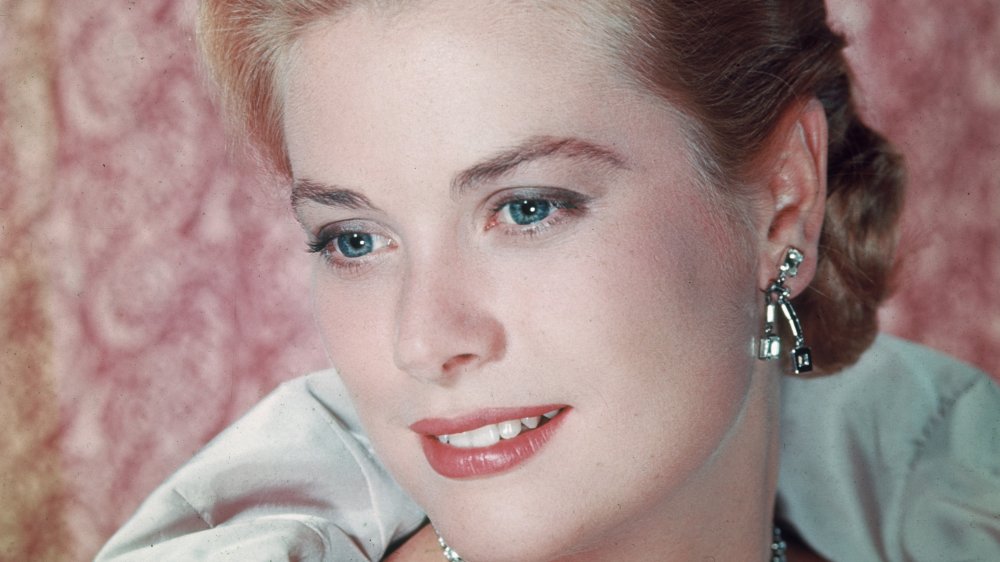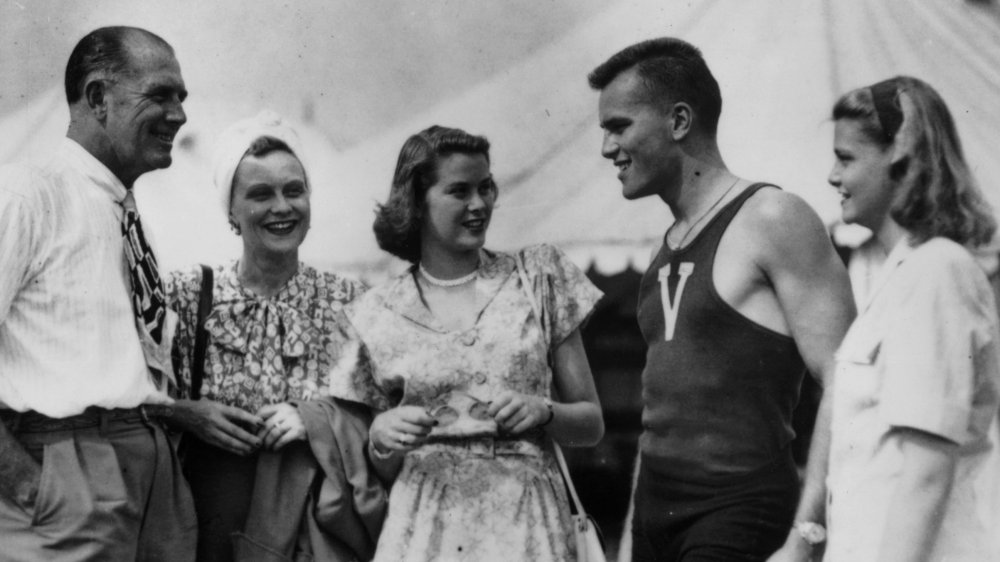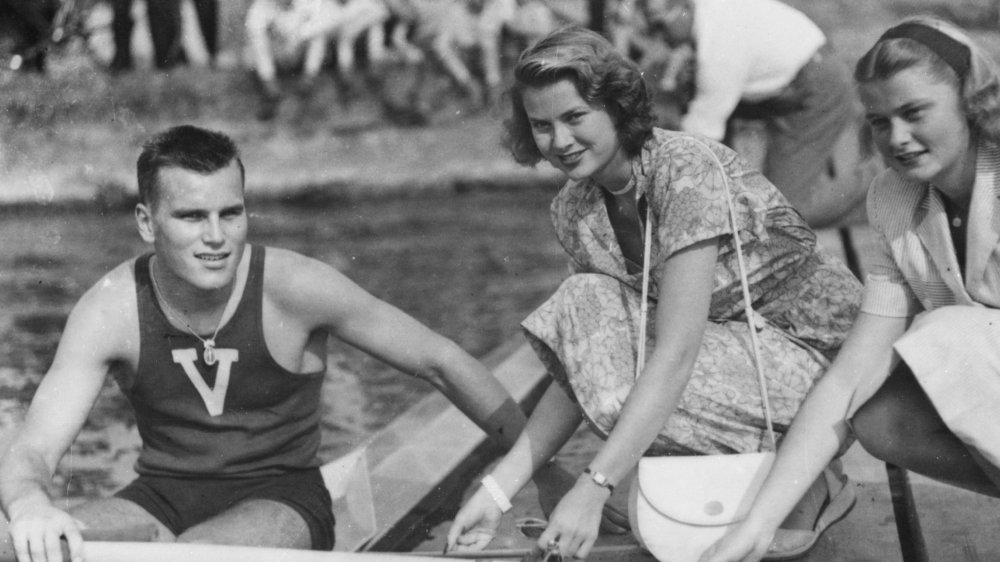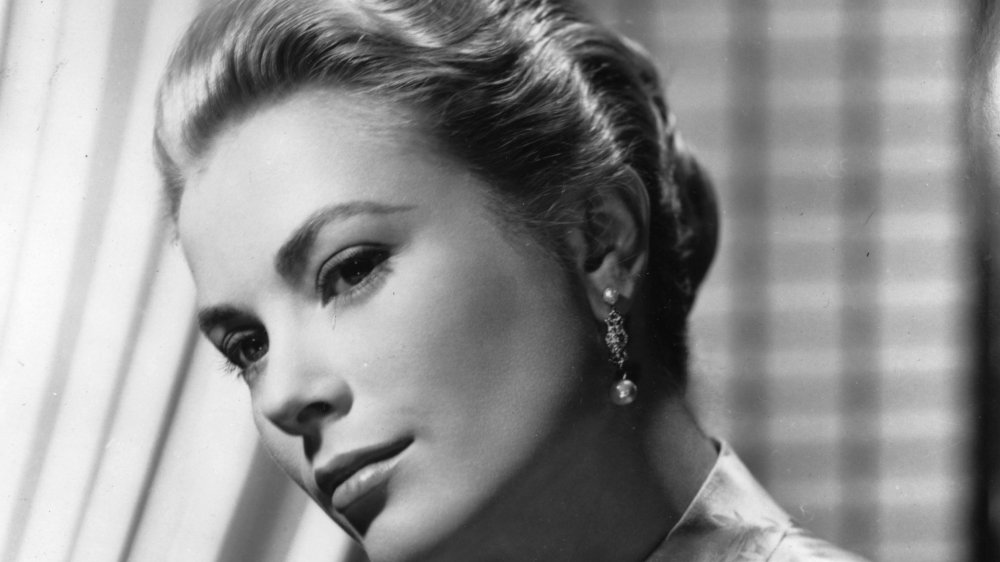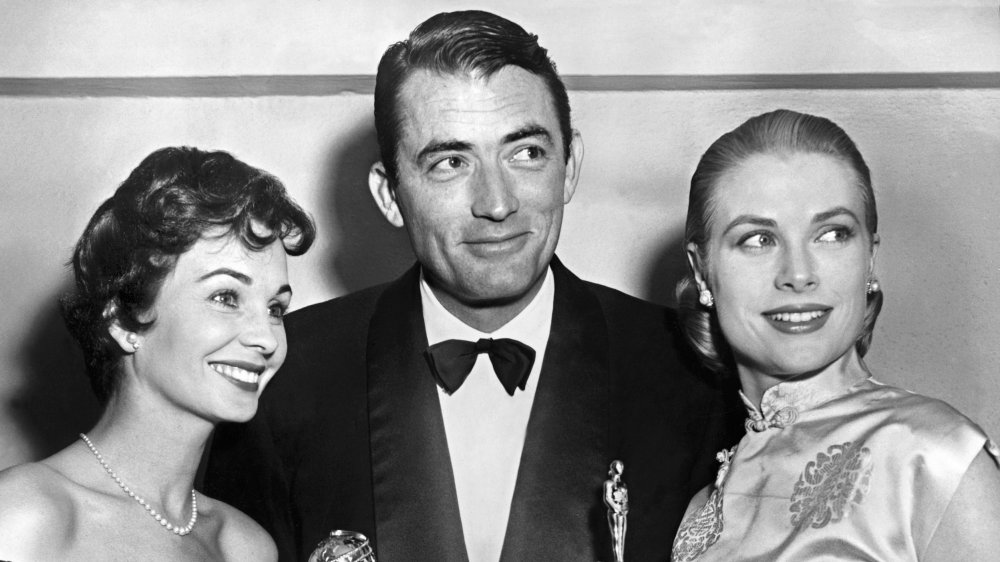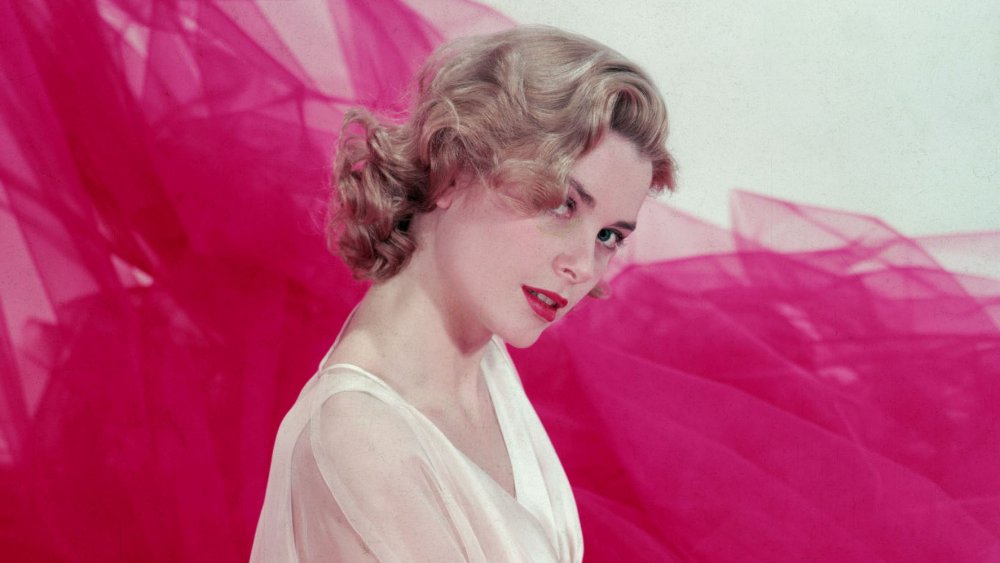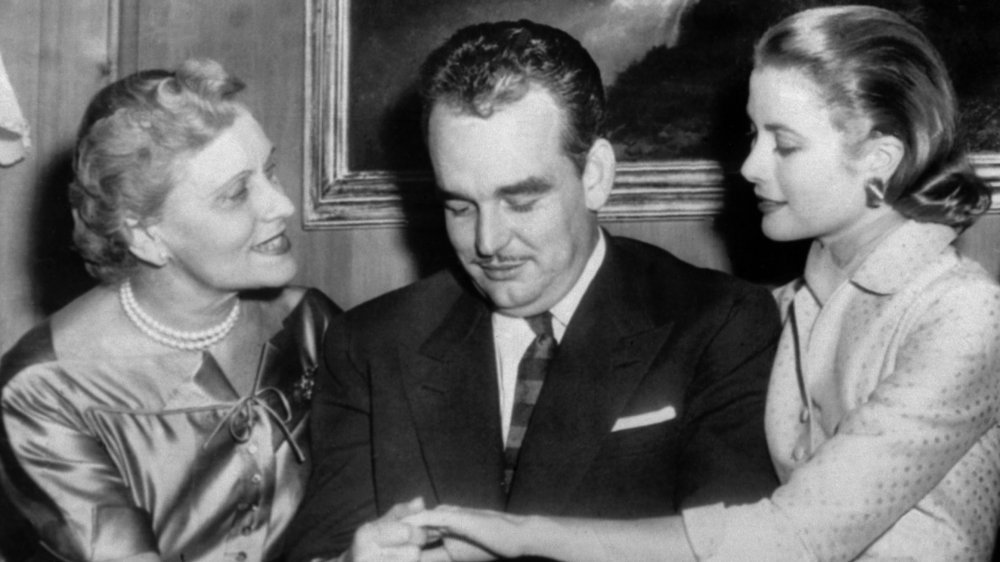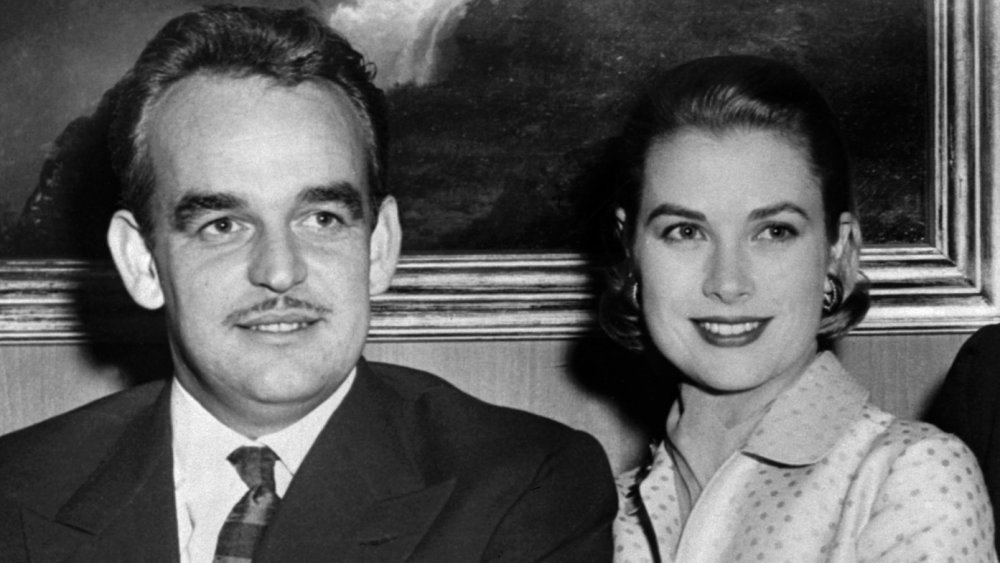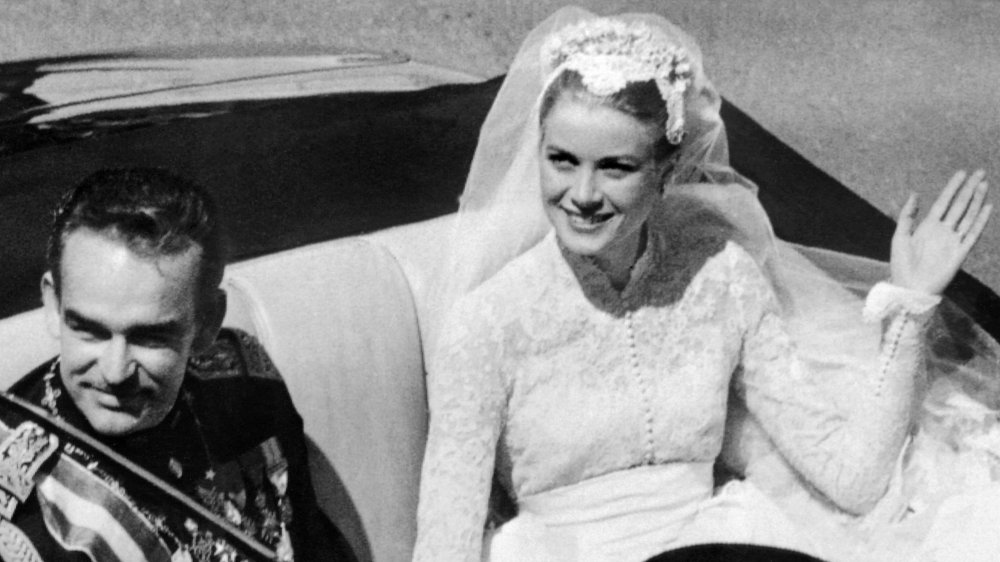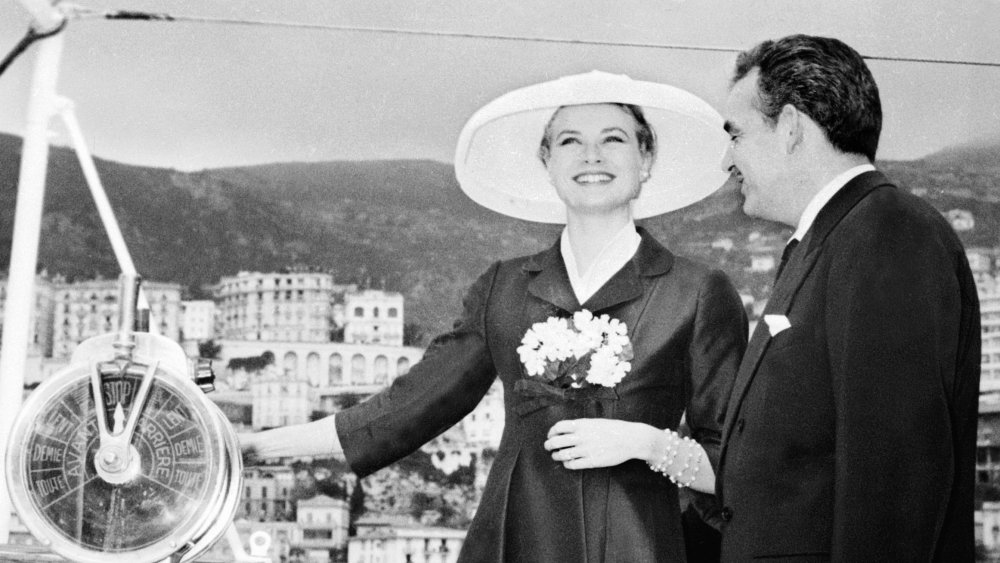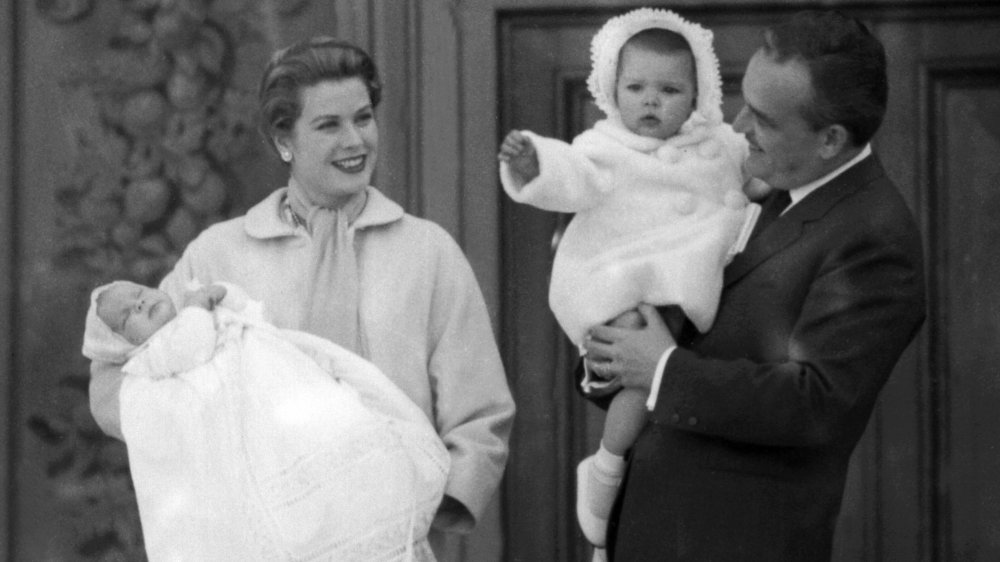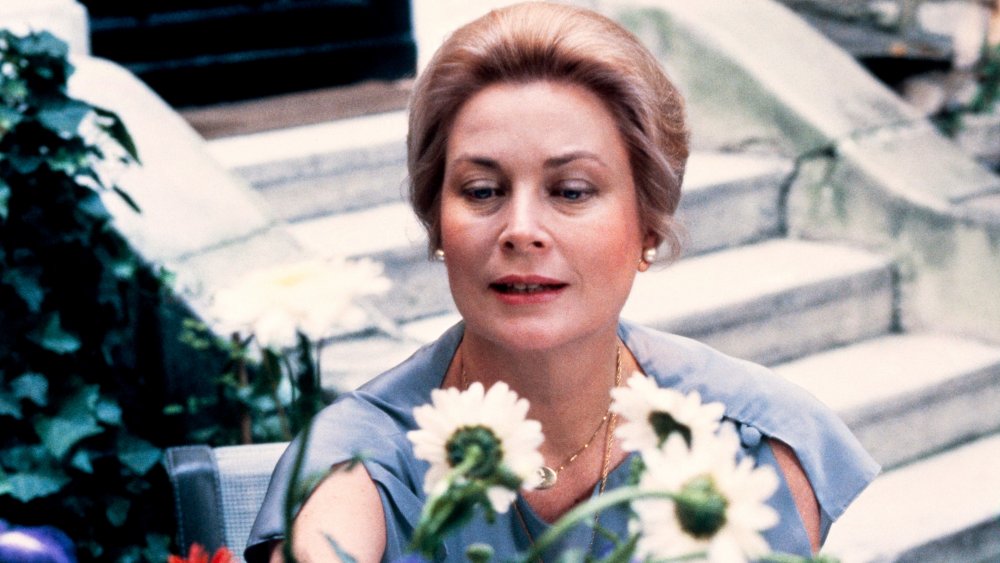The Tragic Real-Life Story Of Grace Kelly
Hardly anyone can think of classic Hollywood without recalling actress Grace Kelly. She's a pretty unforgettable persona. Grace has long been identified as the epitome of the cool, refined blonde, the pinnacle of Old Hollywood sophistication. She wasn't in very many films, but one of her roles earned her an Academy Award for Best Actress and Grace managed to have an extraordinary impact on Hollywood with her looks and her talent.
Remembered as the frosty blonde socialite with the icy exterior — rumored to be hiding a fiery, passionate woman underneath — Grace Kelly has long been a source of fascination, even decades after her death. Hardly a rags-to-riches story, Grace rose from the wealthy Philadelphia social scene to the Broadway stage to the Hollywood screens until she finally ascended to the ultimate reward — royalty.
It would seem that a woman possessing such beauty, talent, and breeding would have an easy climb to the top. Still, Grace Kelly would find that elegance and social standing don't necessarily guarantee a carefree life — not even as a royal princess. Despite the outward appearance of vibrant prosperity, Grace Kelly's life was far from a fairy tale.
Grace Kelly was born into privilege
Grace Patricia Kelly was the third child born into a wealthy Irish-Catholic family in Philadelphia. Culturally, the Kellys were very similar to the Kennedys. And also like the Kennedys, the Kellys were never fully accepted into high society, despite their substantial wealth. If someone had the good luck of being wealthy around the early to middle part of the 20th century, they still had to have the right background to be welcomed among the upper class. Unfortunately, it didn't matter how much money a family had if they were of the Irish-Catholic persuasion; the WASP-y elites still gave them the cold shoulder.
Grace's father, Jack Kelly, according to an account in the Washington Post, was not one to be put out. If he wasn't going to be accepted among the Philadelphia Main Line elites, he would have just as luxurious a mansion as any aristocrat. So he built an elegant family home in the East Falls neighborhood. Jack was the son of Irish immigrants and made his fortune in the construction trade during the post-World War I boom. He was also one of the rare few unaffected by the 1929 market crash. Unlike many others, Jack never dabbled in stocks, preferring to keep his money in cash and government bonds. He might not have had the breeding for high society, but Jack Kelly and his family were going to live just as well as any pedigreed elite.
Grace Kelly was the black sheep of the family
Grace Kelly came from a wildly athletic and sociable family. Her father, Jack, was a three-time Olympic gold medalist in sculling (rowing). Her mother, Margaret Majer Kelly, of hearty German stock, was a cover-girl model and a competitive swimmer. An athletic extrovert, Jack Kelly expected all of his children to be just as gregarious and robust as himself. Only three out of the four Kelly children lived up to his expectations. Eldest child Peggy was witty and outgoing and her father's blatant favorite. John Jr., or "Kell," was the only boy and later became a champion rower. Youngest child Lizanne was the pampered baby of the family.
According to Vanity Fair, Grace, unlike the rest of her family, was shy, introverted, and more delicate of health (she was known to suffer from asthma and sinus problems as a child), much to her father's disappointment. Between her health and her temperament, Grace was her father's least favorite out of his four children. Grace's serenity made her stand out from her siblings, but that wasn't enough to interest or impress her father.
Not even Grace's siblings were sympathetic to her relationship with their father. At one point, Lizanne locked her in a cupboard. Rather than try to escape, Grace simply stayed in the closet and quietly played with her dolls until someone discovered her hours later. She was probably just relieved to have some quiet time away from her loud family.
The Kelly family disapproved of Grace's career
Grace Kelly's family was surprised and disapproving when she announced her intention to become an actress. Her father most notably was displeased with his daughter's career choice and said that an actress was, according to Biography.com, "a slim cut above streetwalker."
This was a relatively typical sentiment of the time, especially for someone of Jack Kelly's social standing. However, it might seem an unusual attitude to take, given that both of Jack's brothers were career theater people. As Biography notes, his brother, Walter Kelly, was a successful vaudeville performer while his other brother, George Kelly, was a Pulitzer Prize-winning playwright.
"Uncle George" was one of Grace's greatest influences and became her primary mentor and confidant. Even if the rest of her family disapproved of her career, Grace had at least one source of familial encouragement. It was thanks to her uncle's guidance that Grace Kelly learned the ins and outs of Hollywood and was able to gain admittance to the American Academy of the Dramatic Arts in Manhattan.
Grace Kelly worked her way up
Even though Uncle George helped pave her way to the Academy, Grace Kelly tried to avoid depending too much on family relations or money to advance her career. Her parents didn't want her to move to New York, but Grace was insistent. According to Vanity Fair, she even covered her own tuition at the Academy by taking lucrative jobs as a commercial model, which most likely shocked her family.
Grace also had to lose her Philadelphian accent and get control of her sinus troubles, which she accomplished by taking diction lessons and wearing a clothespin on her nose. Her newly refined accent was the subject of some mockery from her family. After a few roles on Broadway, Grace decided to try Hollywood. As noted in Vanity Fair, she took great care with her appearance when attending auditions, dressing conservatively and ladylike, even wearing white gloves, highly unusual in the Hollywood world. But it worked. Directors loved her presentation.
Her biggest break arrived when Gary Cooper discovered her during her first film, Fourteen Hours. After seeing her in action, Cooper had her cast as his wife in his latest film, High Noon. Cooper's endorsement put Grace Kelly on the road to stardom. After High Noon, she went on to another major motion picture, Mogambo, alongside Clark Gable. She later won the Academy Award for Best Actress for The Country Girl. Grace also became a favorite of director Alfred Hitchcock, who notoriously had a weakness for elegant blondes.
All of Grace Kelly's men
Grace seemed to have a particular type when it came to her romantic choices — she definitely preferred older men, according to Express. A psychologist might assess that Grace could have been unconsciously seeking a father-like figure given her difficult relationship with her own father. It also probably didn't help that she was constantly cast as the romantic interest of men who were usually more than 20 years her senior.
This preference started while Grace was still at the academy. According to Vanity Fair, she had a two-year romance with one of her instructors, Don Richardson. Not only was Richardson 11 years Grace's senior, but he was Jewish — something that wildly aggravated her notoriously anti-Semitic father. Family pressure put an end to the relationship.
Grace was said to have had many affairs with her older, male — sometimes married — co-stars. She has been linked to romances with major actors such as Clark Gable (28 years older), Bing Crosby (26 years older), Ray Milland (22 years older), and Frank Sinatra (14 years older). At one point, she dated Prince Aly Khan and almost married fashion designer Oleg Cassini. Grace's love letters to Cassini were discovered and printed by Harper's Bazaar many years after her death.
Despite her prim and proper exterior, Grace had a colorful reputation among the men of Hollywood. Even in recent years and long after her death, the details of her romantic dalliances are still a point of interest.
Art imitated life for Grace Kelly
Grace Kelly met her future husband, Prince Rainier III of Monaco at the Cannes Festival while promoting To Catch A Thief. As noted by Country Living, it was through actress Olivia de Havilland that Grace was formally introduced to him. At the time, de Havilland was married to Pierre Galante, the editor of Paris-Match magazine. Galante was the one with a direct connection to the prince. After meeting Grace on the train from Paris to Cannes, de Havilland asked Grace if she would be interested in a personal meeting with Prince Rainier.
"Grace struck me on first encounter as a rather reserved, self-possessed, well brought up young woman," de Havilland said many years later in an interview with People.
After getting approval from MGM, Grace agreed to meet the prince. This initial first meeting would spark a correspondence between the two, which later resulted in their engagement. Grace fell in love with the prince while she was filming The Swan, where she played a young princess preparing to become the wife of a European king. MGM even filmed their wedding in 1956 and broadcast it across Europe.
Did Prince Rainier marry Grace Kelly for the money?
While there has been little doubt that Grace Kelly found a love match with Prince Rainier III, some have wondered whether there was a mercenary aspect to the marriage, according to the Telegraph (via Vogue). Prince Rainier came to the throne in 1949, right after the devastation of World War II. He not only inherited a principality, but he had to deal with a pile of financial problems. The post-World War II world was not kind to a principality whose wealth was dependent on the success of its famous casino, as New Republic notes.
First, Rainier decided to make Monaco a tax haven, making it look more appealing to foreign millionaires, tourists, and businesses. Secondly, the unmarried Rainier needed his future wife to bring a tidy sum into their marriage. And a beautiful Hollywood actress could bring the money and the publicity to Monaco.
Grace wasn't even the first actress on Rainier's short-list. At one point, according to the Chicago Tribune, he had an interest in Marilyn Monroe. A letter was sent to her. Monroe ultimately turned Rainier down, not fancying herself the princess type. Plus, Monroe was beginning her romance with playwright Arthur Miller and was eager for more serious film work. Then, Prince Rainier met Grace Kelly, who had the looks, the prestige, and the cash.
It's not easy to be a princess, even for Grace Kelly
As it would turn out, becoming a princess wasn't all charming princes, palaces, and horse-drawn carriages. For Grace Kelly, the actual path to princess-hood was far from a fairy tale, according to the Chicago Tribune. First, Grace would have to give up her acting career and renounce her U.S. citizenship. That was a given. Next, since money was a concern for Monaco, Prince Rainier insisted on receiving a dowry for Grace to have the privilege of marrying a prince. The asking price was $2 million.
Despite having the money, Jack Kelly was not thrilled about paying for marriage for his beautiful, famous daughter. But the prospect of a royal daughter and all the benefits were too good to pass up. Jack and Grace agreed to go halfsies on the dowry.
Finally, Grace had to submit to a fertility test to prove that she could produce heirs. Nothing says "fairy tale" like an invasive and uncomfortable medical procedure. There was actually a reason for this test. Monaco was still under an old agreement with France from 1918 which dictated that if Monaco had no heir, the principality would be returned to French rule. As embarrassing as a fertility test would have been for Grace, for the royal family, it was critical. Grace evidently figured that she'd come this far and agreed to go through with the exam. Once her womb was verified fruitful, the wedding could proceed.
Princess Grace longed to return to acting
Prince Rainier may have had a vested interest in marrying a beautiful starlet, but that didn't mean he had any admiration for the acting profession. Grace Kelly's Hollywood fame brought significant and valuable publicity to Monaco, but Rainier disapproved of Grace's former career. He viewed it as an undignified profession, particularly for a royal princess. He seemed to share similar sentiments as Grace's father, regarding acting as too common. Probably out of concern that Grace's movies would negatively impact the image of the royal family, according to the Guardian, Rainier banned all of his wife's films in Monaco for years.
Although Grace agreed to give up her career in order to become a princess, she still missed acting and wished she could return to her profession. In 1962, she tentatively tried to stage a comeback. She was about to sign on to play the titular role of Alfred Hitchcock's upcoming film, Marnie. However, the public outcry in Monaco was overwhelming. And it wasn't just that she would be acting again. No, the lead character of Hitchcock's film was a criminal. The people of Monaco shuddered at the thought of their refined, elegant princess playing the role of a common crook.
Grace did not return to the screen. According to Vogue, Grace mourned the loss of her career for some time, even telling the Los Angeles Times in 1964, "I miss acting," she said. "Once you're bitten with the acting bug, you never really get over it."
Princess Grace struggled to connect with her children
Grace Kelly had three children with Rainier: Princess Caroline, Prince Albert, and Princess Stephanie. However, she seemed to struggle to connect with her children, possibly as a result of her royal duties and responsibilities. In recent years, after both their parents had passed away, Princess Caroline and Prince Albert revealed in interviews, as reported by Insider, that they weren't particularly close to their mother.
Caroline and Albert were only a year apart and grew up close to each other. They shared a nanny, Maureen Wood, with whom they felt more of a parental bond than with either of their parents. They so preferred their nanny that they would cry for her when Wood was away on her annual vacation. The children missed her so much that Grace would sometimes ask Wood if she could come back to work early. Caroline and Albert added that they were not even allowed to eat dinner with their parents until they were 14 years old.
Even Grace, by her own admission to American biographer J. Randy Taraborrelli, said that she was a hard disciplinarian to her three children. She wasn't above spanking them or speaking harshly, not much differently from her own authoritarian mother.
"When Caroline was little, it seemed like I spanked her every other day. Albert didn't need as much. A sharp word was enough. Stephanie? I should have been beating her like a gong long ago."
Princess Grace of Monaco met a shockingly early death
The news of Princess Grace of Monaco's death took the world by shock. According to the Independent (of Ireland), Grace had been just 52 years old and in fine health as far as anyone knew. Grace was driving her 17-year-old daughter Stephanie to school in Paris one day when tragedy struck. The details of what precisely happened are hazy, but we do know that Grace appeared to take a sharp turn on a steep mountain turn that caused the car to shoot down a 120-foot slope. Stephanie only sustained minor injuries, but Grace suffered a brain hemorrhage. She died on September 14, 1982, at Monaco Hospital (later renamed Princess Grace Hospital Centre).
Grace's eldest daughter, Princess Caroline, stepped up and assumed Grace's role in the royal family. After her death, Prince Rainier established the Princess Grace Foundation in the U.S., an organization dedicated to financially supporting "emerging artists in theater, dance, and film." Prince Rainier never remarried. He was buried beside Grace after his death in 2005.
